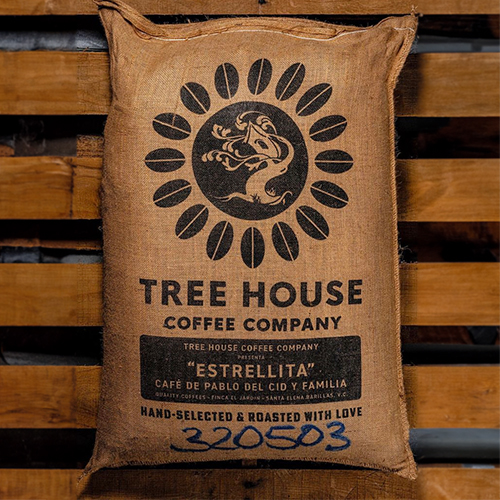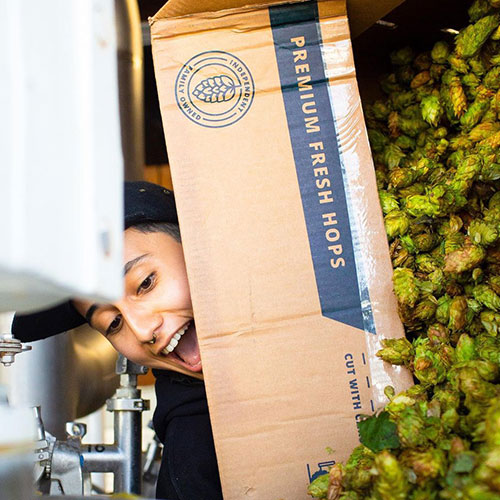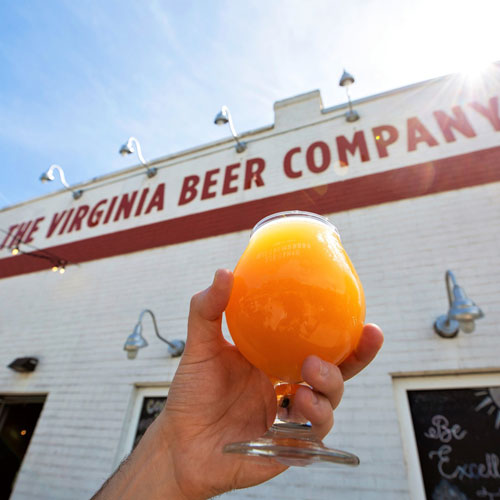To reach the broadest possible demographic, breweries are embracing kosher certification. The post Keeping Kosher in Craft Beer appeared first on CraftBeer.com.
Around a decade ago, Avrahom Pressburger started losing interest in domestic lager. The insurance broker swapped Budweiser for fragrant Blue Moon and seasonal beers from Sam Adams. He examined cans and bottles, looking beyond styles and ABV for a certified-kosher symbol.
Born into Orthodox Judaism in Brooklyn and now living in New York State’s Rockland County, Pressburger follows dietary guidelines that forbid mixing meat and dairy and mandate how foods are processed, produced, and prepared.
Oyster stouts were off the table. What about double IPAs? Or strawberry sour ales? Details on certified beers were scarce, so he crowd-sourced information from BeerAdvocate’s message boards and Facebook groups, eventually creating the website and Instagram account Kosher Craft Beer.
“It’s been a journey,” says Pressburger, who posts pictures of kosher-certified beers such as Deschutes Black Butte Porter and strong Belgian ale La Chouffe. In the absence of certification, he contacts breweries for additional information. “There are just too many ingredients,” he says.
Modern craft beer broke free from orthodoxy by resuscitating historical styles, embracing excess, and tinkering with culinary ingredients. The anything-goes approach garnered attention and sales, but experimentalism left many kosher-adherent customers behind.
“When there’s stuff added beyond the four basic ingredients”—water, yeast, grains, hops—”it raises kosher questions,” says Rabbi Zvi Holland, director of special projects for Star-K, a kosher certification agency in Baltimore, Maryland. (It’s one of five agencies that certify most of America’s kosher food.) “We’ve had [brewers] use Greek yogurt to make a sour ale, which creates a kosher issue.”
To reach the broadest possible demographic, breweries are embracing kosher certification. Boston Beer’s Truly hard seltzer and Twisted Tea are totally kosher, and breweries both regional (Boulevard Brewing, F.X. Matt) and local such as Leikam Brewing in Portland, Oregon, sell kosher beer. Breweries and companies are also turning to kosher beer to celebrate Hanukkah, while New York City rabbinical student Jesse Epstein is reviving the Jewish-themed Shmaltz Brewing brand.
Kosher Certification: Another “Traceability Exercise”
Go to any grocery store and grab non-refrigerated items such as bread or ketchup, and the label will likely contain a hechsher, a symbol or stamp signifying a kosher product.
More than 40 percent of America’s packaged foods are kosher, an outsize stat when you consider that around 2 percent of the country’s population is Jewish. “It makes companies money,” Rabbi Holland says.
Historically, German beer followed another purity law, the Reinheitsgebot, which limited beer to water, hops, and barley. European Jews who immigrated to America in the 19th and 20th centuries would’ve been accustomed to unadorned lagers. “There’s a history of drinking beer without a kosher certification because it wasn’t something that concerned them,” Holland says.
As the 1980s gave way to the 1990s, America was no longer one nation under lager. Breweries began producing assorted beer styles, and “the [kosher] community started to get nervous,” Holland says.
Coors Brewing became the first major brewery to receive its kosher certification, in 1990, followed by Miller Brewing in 1999. (The breweries are now part of Molson Coors Beverage Company.)
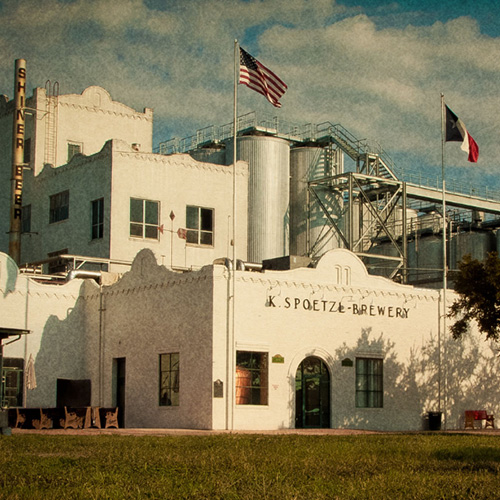
For more than a decade, Spoetzl Brewery has brewed kosher-certified Shiner Bock and more at its Shiner, Texas, facility. The brewery requests kosher certifications from suppliers, and a rabbi visits annually to examine paperwork. “It’s always a joyful event,” says director of brewery and distillery operations Tom Fiorenzi.
Fiorenzi has learned to navigate specific kosher guidelines such as avoiding aging a beer in a wine barrel unless the wine is kosher. And the brewery isolated its on-site restaurant, K. Spoetzl BBQ Co., from brewery operations.
“It’s a big traceability exercise,” says Fiorenzi. “I’m concerned every single day about what’s going into the beer. It’s what we practice and preach.”
Securing approvals can feel punitive for breweries. You didn’t fill out this form. Try again.
“Kosher is collaborative,” says Dan Voce, vice president of operations for F.X. Matt in Utica, New York, which has produced certified kosher beer for more than 10 years. A rabbi visits once or twice a month for a facility walkthrough including looking over raw materials and monitoring ingredient staging and production.
F.X. Matt makes its Saranac beers and contract brews for multiple companies, including Brooklyn Brewery. Kosher certification is a selling point for contract production, especially as companies seek competitive advantages and placements in chains such asWhole Foods.
Food-safety certifications such as kosher “used to be nice to have, but I would say now they’re necessary,” says Voce.
A Conduit to the Jewish Community
Attaining kosher certification won’t immediately draw sales from untapped demographics. Preconceived notions must be rewired, one pint at a time. “Culturally, Jews tend to not be into beer as much as they are into wine and spirits,” says Rabbi Drew Kaplan, founder and publisher of Jewish Drinking.
That’s partly due to beer’s perceived cultural status. People willing to spend big on Scotch or wine for an event might also opt for Heineken or Corona, Pressburger says. Lack of access exacerbates the issue. Specialty beer stores are absent from Orthodox neighborhoods. “Generally speaking, there’s a strong lack of education when it comes to beer in the Orthodox community.”
Solving shortcomings requires creating new beer-drinking occasions. In advance of next year’s relaunch of Shmaltz, which closed in 2021, Epstein conducted an event on a synagogue’s rooftop, invited congregants to homebrew, and threw a Purim party that included a drag performance. “I love going to synagogue, but I recognize not every Jew does,” Epstein says. Shmaltz can reach beyond pews to “build our communities through beer.”
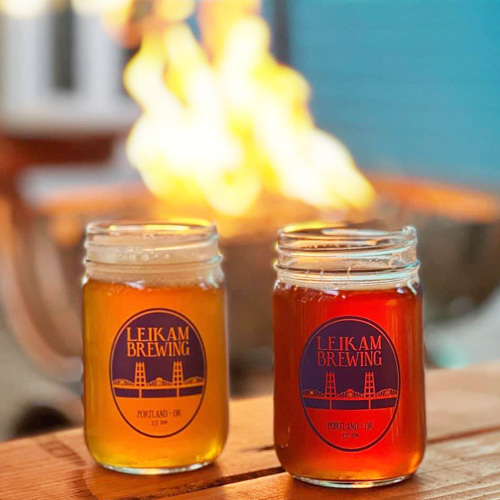
In 2015, Sonia Marie Leikam and her husband opened kosher-certified Leikam Brewing with a desire to be an inclusive, community-driven space. “We’re also vegan and gluten-reduced, but the market differentiator that folks grabbed onto was that we were kosher,” says Leikam, who is Jewish. (Her husband, Theo, is not.)
The brewery focuses on classic styles such as porters and red ales, which are served during events like drag trivia, comedy nights, and live music. This December, Leikam turned its taproom into a pop-up Hanukkah-themed bar called L’chaim featuring Hanukkah-themed bingo, Manischewitz Jell-O shots, and the Maccabeer IPA made for the holiday.
“For folks who are more culturally Jewish, Hanukkah is a moment where they find pride,” Leikam says.
City Brew Tours includes Leikam beer in its Hoppy Hanukkah gift box, and founder and CEO Chad Brodsky hosts a nightly Hanukkah livestream with food pairings and Jewish guests. “The livestream gets to the connecting points of Judaism and beer,” says Brodsky, who typically sells around 1,000 boxes annually.
Not every Hoppy Hanukkah beer is kosher, so Brodsky selects Reinheitsgebot-compliant beers that avoid adjuncts like lactose. Star-K used to keep a list of non-certified beers, but it’s since stopped keeping track; the torrent of releases never stops. “We need to significantly expand the amount of certified beer on shelves,” Rabbi Holland says.
One sticking point is that kosher certification is a monetary investment (it’s typically measured in the thousands of dollars, says Rabbi Holland), and craft breweries need to prioritize any expense. “We’ve chosen where to put our financial resources,” says Leikam, adding that the brewery doesn’t spend money submitting beers to competitions.
There’s never been a better or more confusing time to be a beer drinker. Selecting a six-pack can be overwhelming—doubly so for drinkers keeping kosher. Why limit the audience? “When you create something for a Jewish audience, there’s this idea that you’re limiting your product,” Epstein says. “I believe there’s potential to take something that’s Jewish and give it to everyone.”
The post Keeping Kosher in Craft Beer appeared first on CraftBeer.com.






